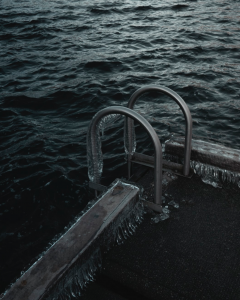views
Find us on Social Media:
Did you know that cold water may activate the sympathetic nervous system and increase blood flow? While a cold shower or ice bath may not sound like the most appealing thing to do with your time, it could be a surprisingly simple way to reduce anxiety and stress.
With the likes of Wim Hoff, aka The Iceman, using cold exposure for mental and physical benefits, how could a cold shower help your anxiety?
You may have already heard of taking cold showers for achy muscles or waking up in the morning. Studies suggest that athletes who soak in cold water after exercise report less muscle soreness than those who use no hydrotherapy. Now, there’s ongoing discussion that it could be a useful anxiety treatment.
Cold water therapy uses cold water to stimulate health benefits in water that’s around 59°F (15°C). The practice has been around for a long time, but in recent years more people are using ice baths, cold water immersion, outdoor swimming, and brisk showers for their mental and physical health.
Cold Therapy Benefits for Anxiety
So, should you have a cold shower for anxiety?
A recent study found that after a single immersion in cold water, participants reported improved mood. An increasing amount of anecdotal and scientific evidence suggests that swimming in cold water may enhance mood.
While it may feel that cold water plunges and outdoor swimming are trending right now, initial research suggests that they may be beneficial for mental health.
Researchers found that winter swimming improves general well-being and mood among swimmers. One case study even found that a 24-year-old woman with anxiety and depression was medication-free after four months of cold water swimming.
Cold Water and Mental Health
Larger trials into sea swimming for depression and anxiety are still ongoing. Cold water may have an impact on the inflammatory system, which has been linked to depression. While early findings look promising, there’s still a lot to discover about cold therapy’s benefits for anxiety and mental health in general.
Another way that cold showers could benefit anxiety is by increasing the feel-good hormones in your brain, known as endorphins. Endorphins can help to reduce symptoms of anxiety and depression. Although a cold shower may offer some benefits to anxiety, it’s not the only home remedy you can try. Other ways to reduce anxiety include:
Regular exercise
Meditation and mindfulness
Breathing techniques for anxiety
A healthy and balanced diet
Reduce caffeine consumption
Consistent sleep
There are various reasons people think that cold water may be beneficial for mental health. First, it’s thought to release stress hormones which give you that feeling of being wide awake. Some research suggests that you may release dopamine during a cold dip which could explain the “high” feeling after a cold swim. Cold water exposure may also help reduce stress by activating certain parts of the nervous system.
Set yourself up for success by starting cold water therapy slowly. A cold shower is one of the easiest and most accessible ways to experience cold therapy. Try ending your warm shower with 30 seconds of cold water and gradually get used to cold showers. If you’re feeling brave, you can also try an ice bath by adding ice to the bathtub or an outdoor cold swim.
When you take a plunge into cold water, it’s seriously cold. If you’re swimming outdoors, it’s important to know that cold water immersion can put a lot of strain on the body. As with anything, it’s essential to speak with your doctor to make sure it’s safe for you. The USDA has a list of water safety tips to help you stay safe in changing conditions.
As a relatively new area of research, there’s still much to find out about how cold water impacts mental health, depression, and anxiety. Be careful with the dangers of cold water, and always check in with your doctor before trying anything new. When done safely, cold water therapy may offer several benefits for both your physical and mental well-being.
Your email address will not be published. Required fields are marked *
Name *
Email *
Website
Comment
You may use these HTML tags and attributes:
Sign up to receive FREE toolkit
From Dr. Hyman, #1 NY Times & Amazon Author














